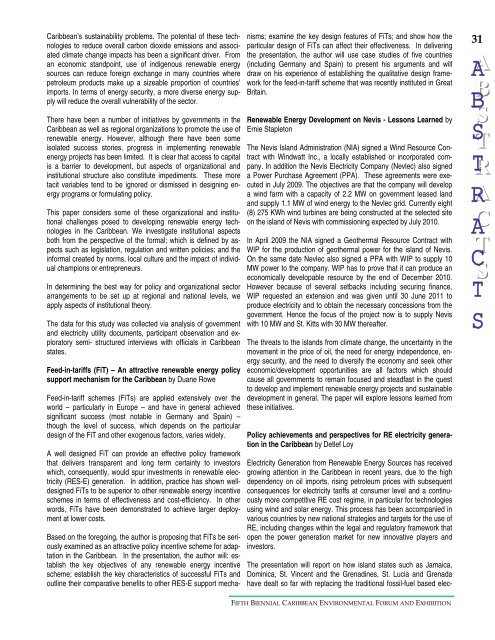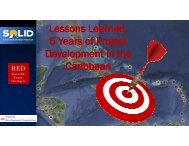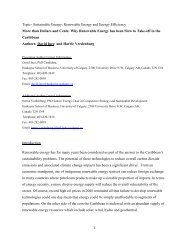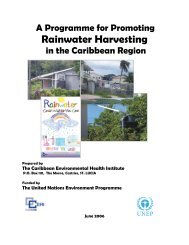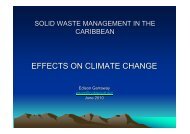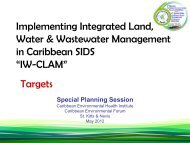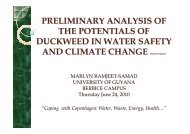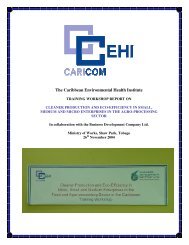conference magazine - Caribbean Environmental Health Institute
conference magazine - Caribbean Environmental Health Institute
conference magazine - Caribbean Environmental Health Institute
Create successful ePaper yourself
Turn your PDF publications into a flip-book with our unique Google optimized e-Paper software.
<strong>Caribbean</strong>’s sustainability problems. The potential of these technologies<br />
to reduce overall carbon dioxide emissions and associated<br />
climate change impacts has been a significant driver. From<br />
an economic standpoint, use of indigenous renewable energy<br />
sources can reduce foreign exchange in many countries where<br />
petroleum products make up a sizeable proportion of countries’<br />
imports. In terms of energy security, a more diverse energy supply<br />
will reduce the overall vulnerability of the sector.<br />
There have been a number of initiatives by governments in the<br />
<strong>Caribbean</strong> as well as regional organizations to promote the use of<br />
renewable energy. However, although there have been some<br />
isolated success stories, progress in implementing renewable<br />
energy projects has been limited. It is clear that access to capital<br />
is a barrier to development, but aspects of organizational and<br />
institutional structure also constitute impediments. These more<br />
tacit variables tend to be ignored or dismissed in designing energy<br />
programs or formulating policy.<br />
This paper considers some of these organizational and institutional<br />
challenges posed to developing renewable energy technologies<br />
in the <strong>Caribbean</strong>. We investigate institutional aspects<br />
both from the perspective of the formal; which is defined by aspects<br />
such as legislation, regulation and written policies; and the<br />
informal created by norms, local culture and the impact of individual<br />
champions or entrepreneurs.<br />
In determining the best way for policy and organizational sector<br />
arrangements to be set up at regional and national levels, we<br />
apply aspects of institutional theory.<br />
The data for this study was collected via analysis of government<br />
and electricity utility documents, participant observation and exploratory<br />
semi- structured interviews with officials in <strong>Caribbean</strong><br />
states.<br />
Feed-in-tariffs (FiT) – An attractive renewable energy policy<br />
support mechanism for the <strong>Caribbean</strong> by Duane Rowe<br />
Feed-in-tariff schemes (FiTs) are applied extensively over the<br />
world – particularly in Europe – and have in general achieved<br />
significant success (most notable in Germany and Spain) –<br />
though the level of success, which depends on the particular<br />
design of the FiT and other exogenous factors, varies widely.<br />
A well designed FiT can provide an effective policy framework<br />
that delivers transparent and long term certainty to investors<br />
which, consequently, would spur investments in renewable electricity<br />
(RES-E) generation. In addition, practice has shown welldesigned<br />
FiTs to be superior to other renewable energy incentive<br />
schemes in terms of effectiveness and cost-efficiency. In other<br />
words, FiTs have been demonstrated to achieve larger deployment<br />
at lower costs.<br />
Based on the foregoing, the author is proposing that FiTs be seriously<br />
examined as an attractive policy incentive scheme for adaptation<br />
in the <strong>Caribbean</strong>. In the presentation, the author will: establish<br />
the key objectives of any renewable energy incentive<br />
scheme; establish the key characteristics of successful FiTs and<br />
outline their comparative benefits to other RES-E support mechanisms;<br />
examine the key design features of FiTs; and show how the<br />
particular design of FiTs can affect their effectiveness. In delivering<br />
the presentation, the author will use case studies of five countries<br />
(including Germany and Spain) to present his arguments and will<br />
draw on his experience of establishing the qualitative design framework<br />
for the feed-in-tariff scheme that was recently instituted in Great<br />
Britain.<br />
Renewable Energy Development on Nevis - Lessons Learned by<br />
Ernie Stapleton<br />
The Nevis Island Administration (NIA) signed a Wind Resource Contract<br />
with Windwatt Inc., a locally established or incorporated company.<br />
In addition the Nevis Electricity Company (Nevlec) also signed<br />
a Power Purchase Agreement (PPA). These agreements were executed<br />
in July 2009. The objectives are that the company will develop<br />
a wind farm with a capacity of 2.2 MW on government leased land<br />
and supply 1.1 MW of wind energy to the Nevlec grid. Currently eight<br />
(8) 275 KWh wind turbines are being constructed at the selected site<br />
on the island of Nevis with commissioning expected by July 2010.<br />
In April 2009 the NIA signed a Geothermal Resource Contract with<br />
WIP for the production of geothermal power for the island of Nevis.<br />
On the same date Nevlec also signed a PPA with WIP to supply 10<br />
MW power to the company. WIP has to prove that it can produce an<br />
economically developable resource by the end of December 2010.<br />
However because of several setbacks including securing finance,<br />
WIP requested an extension and was given until 30 June 2011 to<br />
produce electricity and to obtain the necessary concessions from the<br />
government. Hence the focus of the project now is to supply Nevis<br />
with 10 MW and St. Kitts with 30 MW thereafter.<br />
The threats to the islands from climate change, the uncertainty in the<br />
movement in the price of oil, the need for energy independence, energy<br />
security, and the need to diversify the economy and seek other<br />
economic/development opportunities are all factors which should<br />
cause all governments to remain focused and steadfast in the quest<br />
to develop and implement renewable energy projects and sustainable<br />
development in general. The paper will explore lessons learned from<br />
these initiatives.<br />
Policy achievements and perspectives for RE electricity generation<br />
in the <strong>Caribbean</strong> by Detlef Loy<br />
Electricity Generation from Renewable Energy Sources has received<br />
growing attention in the <strong>Caribbean</strong> in recent years, due to the high<br />
dependency on oil imports, rising petroleum prices with subsequent<br />
consequences for electricity tariffs at consumer level and a continuously<br />
more competitive RE cost regime, in particular for technologies<br />
using wind and solar energy. This process has been accompanied in<br />
various countries by new national strategies and targets for the use of<br />
RE, including changes within the legal and regulatory framework that<br />
open the power generation market for new innovative players and<br />
investors.<br />
The presentation will report on how island states such as Jamaica,<br />
Dominica, St. Vincent and the Grenadines, St. Lucia and Grenada<br />
have dealt so far with replacing the traditional fossil-fuel based elec-<br />
31<br />
A<br />
B<br />
ST<br />
TR<br />
RA<br />
AC<br />
T<br />
C<br />
S<br />
T<br />
S<br />
FIFTH BIENNIAL CARIBBEAN ENVIRONMENTAL FORUM AND EXHIBITION


